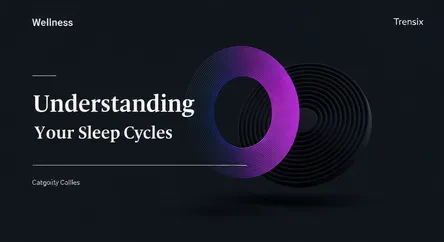Wellness
Understanding Your Sleep Cycles

Discover what sleep cycles are and why tracking them with new tech has become a major wellness trend for improving mental and physical health.
What is it?
A sleep cycle is the progression through different stages of sleep that your brain and body go through each night. An entire cycle typically lasts about 90 to 110 minutes, and a person usually experiences four to six cycles per night. The two main phases are Non-Rapid Eye Movement (NREM) and Rapid Eye Movement (REM) sleep. NREM is divided into three stages: N1 (light sleep), N2 (deeper sleep where heart rate slows), and N3 (deep, restorative sleep). REM sleep is when most dreaming occurs, and brain activity is high, similar to when you're awake. Each stage plays a critical role, from physical repair during deep sleep to memory consolidation during REM sleep.
Why is it trending?
The focus on sleep cycles is trending due to a growing public awareness of sleep's vital role in overall health, sparking a "sleep optimization" movement. This has been fueled by the explosion of wearable technology like smartwatches and rings (e.g., Oura, Whoop) that provide detailed sleep stage tracking. These devices turn sleep into measurable data, allowing users to see how much deep and REM sleep they're getting. As people seek to enhance their well-being, they are moving beyond simply counting hours slept to analyzing the quality of those hours. This data empowers them to experiment with lifestyle changes to improve their sleep architecture for better physical and mental performance.
How does it affect people?
Understanding and optimizing sleep cycles directly impacts daily life by improving cognitive function, emotional regulation, and physical health. By ensuring enough time in deep sleep, the body can better repair tissues and strengthen the immune system. Sufficient REM sleep is crucial for memory consolidation, learning, and processing emotions. People who track their sleep cycles can identify how factors like caffeine intake, stress, or late-night screen time disrupt their sleep quality. This awareness allows them to build healthier routines, leading to waking up feeling more refreshed, having better focus during the day, and reducing the long-term risk of chronic health issues.